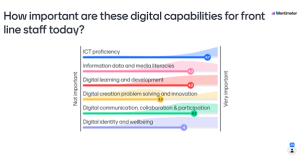Last term Scott Hibberson and I ran a pair of online workshops for the M25 library consortium CPD programme. Scott has posted his initial thoughts on the first workshop, aimed at frontline staff. Here are some reflections on the second, aimed at their supervisors and managers. The M25 consortium is a collaboration of higher education libraries in and around the M25 region but we also welcomed participants from libraries across the UK. This post will offer some reflections on the activities and learning that took place. I’ll also offers some tips that may be useful for other organisations considering a similar event.
The frontline is digital and physical
The pandemic prompted big changes to the delivery of library services and accelerated a shift to digital that was already underway. Whilst remote support via phone, email or webchat is not new, most frontline roles tended to be associated with physical locations such as the helpdesk or issue desk. These work patterns were highly disrupted during lockdown. RLUK’s report Covid 19 and the digital shift in action found that:
“[Frontline staff] work was often of a physical, personal nature, or collection-based nature, and involved face-to-face interactions with users, the reshelving and movement of library stock, or the care and oversight of the collection. They were less likely to have experience of remote working than other colleagues, to have the hardware to do so, or to have received training on platforms to enable this. As a result of the nature of their substantive role, the transition to remote working was often the more difficult for these colleagues and involved a greater degree of role realignment and upskilling on remote working platforms.”
As one of our workshop participants commented,
“The frontline is wherever the student needs it to be.”
Frontline work through a digital lens
We took the six elements of the Jisc digital capabilities framework as a starting point to assess what supervisors and managers felt were the most important skills for their staff. All scored fairly high as shown in the screenshot:

Of these capabilities, those which participants thought were most likely to grow in importance over the next 3-5 years were a) digital learning and development and b) digital communication, collaboration and participation. However, all elements were seen as likely growth areas.
We showed supervisors and managers the outputs of activities their frontline staff had completed earlier in the day (see Scott’s previous post for more on this). They were then able to spend some time in groups, identifying challenges around the support of frontline staff digital skills and confidence, as also sharing solutions. They posted their key points to a Jamboard which they could access after the workshop and share with colleagues.
Digital wellbeing
Supervisors and managers need to look after their own digital wellbeing if they are to lead their teams effectively. They are also in a good position to model positive digital working practices to others. Our workshop participants shared their own top digital wellbeing tips. They ranged from the cheerful (“Be brave, just try things, you can’t break it!”) to the practical (blue light filters on devices to help to unwind at the end of the day).
The human touch
Frontline library staff are often a first point of contact for students, including those facing difficulties in their student life and learning. At their simplest, frontline encounters can be a basic Q&A about some aspect of using the library or technology. But they can also be part of a more complex picture. Behind the “library enquiry” or “IT enquiry” there is a human being who may have unspoken needs. They may require reassurance or referral to specialist support. These can be vital to a student’s sense of belonging.
As student and staff use of virtual services increases alongside face to face provision, frontline staff will need ongoing encouragement to build digital skills and confidence as an underpinning element of their role. It will be interesting to see what comes out of SCONUL’s libraries after lockdown programme which is exploring, among many other things, the theme of the dynamic workforce. On the strength of the learning in our workshop, digital capabilities for frontline staff deserves to be high on the list of priorities for universities and colleges.
Tips on planning a collaborative workshop
Here are some top tips if you’re planning on working with a trainer to offer a workshop for your own organisation or consortium:
- Consider the platform, tools and activities you’re going to use. Will they work for your participants? We went for tools that were easy to grasp for first time users and would allow us to share the outputs easily with participants afterwards
- Have conversations! Scott and I found it very helpful to have a couple of calls with our M25 contacts beforehand. This gave us a much better feel for their members’ expectations so we could design activities to suit. It also made it easier for the M25 organisers to act as breakout room facilitators alongside Jisc staff, where they chose to do so
- The M25 consortium were kind enough to share their feedback survey with us in advance, allowing us to provide an option for participants to contact us for more information if needed. They also sent us the detailed feedback. Lots of organisations don’t offer this for external trainers but I think it’s really helpful. Not only do you get to enjoy the positive comments, there are always points you can learn from, to improve the session for the next time!
Resources from both workshops are available. Thank you to the M25 academic library consortium for working with us!
If you’re interested in looking further at this topic, there is a free one-hour session in March on How are professional services staff experiencing the digital landscape you offer?

